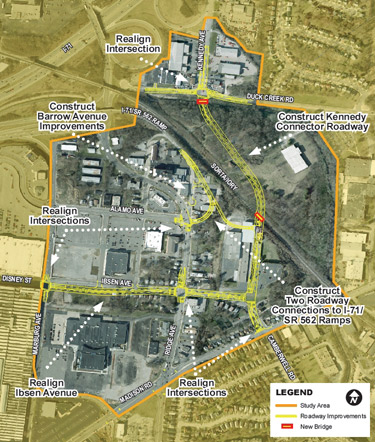The
OKI Regional Council of Governments approved two $6 million requests for phases one and two of the long-awaited Kennedy Connector project. The $12 million total is by far the largest amount of any project receiving funds through the federal
Surface Transportation Program (STP) or
Congestion Mitigation/Air Quality program as allocated by OKI.

The Kennedy Connector requests were rated as two of the top requests among the 33 STP/CMAQ projects applying for more than $90 million in transportation funds.
Once complete, the project will connect the Kennedy Avenue/Duck Creek Road intersection to the current Madison Road/Camberwell intersection (
map). Cincinnati officials state that the new roadway will be called Kennedy Avenue and will improve access to nearby land and businesses.
"This is about better transportation access and connectivity, but probably more significant is the effect on economic development of improved business access for 5/3 Bank and Coca-Cola, and the additional opportunities for new economic development nearby," stated Brian Cunningham, OKI spokesperson.
The Kennedy Connector project is one of the recommendations to come out of the
Eastern Corridor study which include a variety of multi-modal transportation improvements on Cincinnati's east side. In addition to the new roadway, the project also includes the realignment of several existing roadways and intersections nearby to further improve traffic flow and access in the area.
The $12 million in STP funds covers 80 percent of the total $15 million project cost, with the remaining 20 percent coming in a required local match. OKI officials state that the maximum award for STP funds is $6 million, and that the two-phases of the Kennedy Connector project act as two independent projects.
"The projects approved are critical to continuing our efforts to provide our citizens with a variety of commuting options that will save them time and money while alleviating stress that comes from traveling on congested roadways," exclaimed OKI Executive Director Mark Policinski. "OKI continues to move multi-modal projects forward which benefit our commuting population, environment and economy."
Construction for Phase 1 is expected to begin in 2013, Phase 2 will start a year later in 2014, with both phases are expected to be completed by 2016.
Writer:
Randy A. SimesStay connected by following Randy on Twitter
@UrbanCincy
Enjoy this story?
Sign up for free solutions-based reporting in your inbox each week.